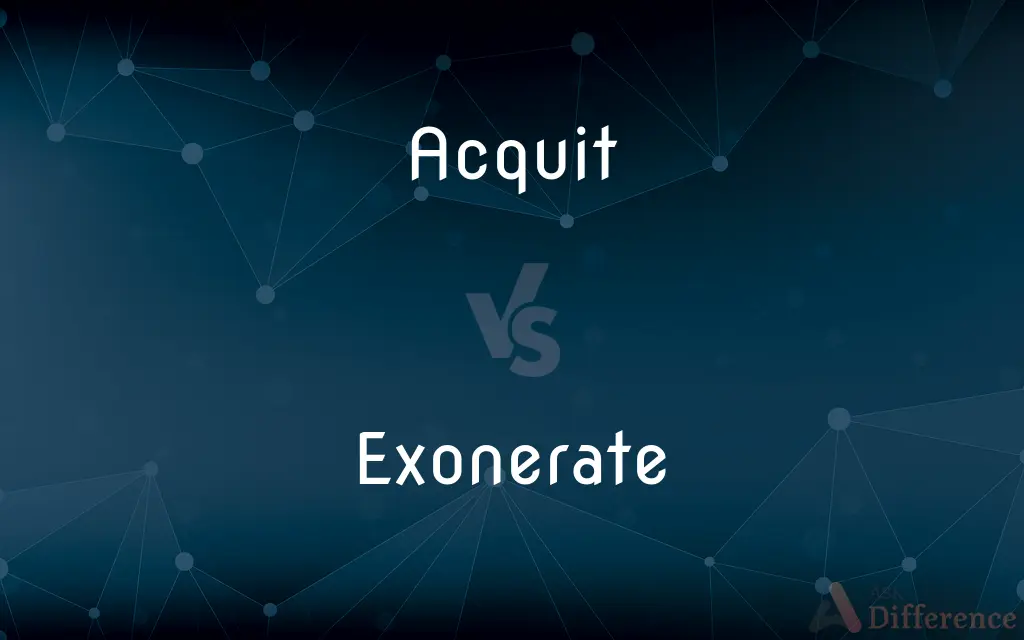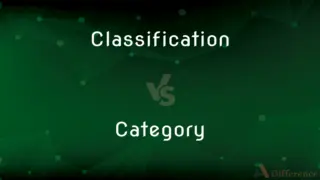Acquit vs. Exonerate — What's the Difference?
By Tayyaba Rehman & Fiza Rafique — Updated on April 16, 2024
Acquit means to legally declare someone not guilty of a crime; exonerate implies clearing from accusations or blame after evidence or investigation.

Difference Between Acquit and Exonerate
Table of Contents
ADVERTISEMENT
Key Differences
Acquitting someone in a court of law involves a legal judgment that the defendant is not guilty of the charges brought against them, typically following a trial. Whereas, exoneration goes beyond the legal boundaries of acquittal by often involving a reevaluation of the evidence or new evidence proving the accused's innocence.
An acquittal occurs through a formal legal process, usually in a court, where the outcome hinges largely on the evidence presented during the trial. On the other hand, exoneration can occur both inside and outside of court settings and often addresses the underlying truth of the accusation rather than just the available legal evidence.
People who are acquitted may still carry public or social suspicion despite the not guilty verdict. Exoneration, however, usually clears the individual’s name in the public eye, as it often comes with a declaration of factual innocence.
Acquittal does not necessarily imply that the person is innocent of the crime, merely that there was not enough evidence to convict. In contrast, exoneration is frequently associated with proving that the person was wrongfully accused or is factually innocent.
The legal consequence of an acquittal is that the defendant cannot be retried for the same offense, a protection known as "double jeopardy." Exoneration, while it may also protect against further prosecution, often leads to additional legal outcomes, such as compensation or public apologies, highlighting the wrongful nature of the original charges.
ADVERTISEMENT
Comparison Chart
Definition
Declaring not guilty in a legal trial
Clearing from blame with new evidence
Implication
Legal non-guilt
Suggests factual innocence
Legal Process
Primarily in court settings
Can be in or out of court
Public Perception
May still be seen as possibly guilty
Typically restores public reputation
Outcome & Protection
Protected from retrial
May lead to compensations
Compare with Definitions
Acquit
A legal term signifying that someone is found not guilty of a crime in a court of law.
The jury decided to acquit the defendant after the evidence was deemed insufficient.
Exonerate
Restoring a person's reputation from a wrongful accusation.
The document proving his alibi was crucial for his exoneration.
Acquit
A formal declaration of non-guilt by a judge or jury.
After hours of deliberation, the jury voted to acquit.
Exonerate
Freeing someone from any guilt or blame beyond the legal proceedings.
The exoneration came after years of fighting for justice in a flawed legal system.
Acquit
A verdict that releases an individual from criminal responsibility.
The court will acquit the accused if the prosecution fails to prove guilt beyond a reasonable doubt.
Exonerate
A declaration that someone is not responsible for a criminal act.
The investigative team worked to exonerate the suspect after flaws in the case were found.
Acquit
A conclusion in a legal trial absolving someone from charges.
Despite public opinion, the legal system must acquit if the case lacks hard evidence.
Exonerate
To officially absolve someone from blame for wrongdoing, often after considering new evidence.
New DNA evidence served to exonerate the previously convicted individual.
Acquit
Involves the removal of legal blame in a criminal trial.
The defense’s goal is to acquit their client by undermining the prosecution's arguments.
Exonerate
Often involves rectifying past judicial errors or misjudgments.
The exoneration highlighted the importance of integrity in forensic science.
Acquit
(Law) To find not guilty of a criminal offense.
Exonerate
(of an official body) absolve (someone) from blame for a fault or wrongdoing
They should exonerate these men from this crime
An inquiry exonerated those involved
Acquit
To conduct (oneself) in a specified manner
Acquitted herself well during the interview.
Exonerate
Release someone from (a duty or obligation)
Pope Clement V exonerated the king from his oath to the barons
Acquit
(Archaic) To release or discharge from an obligation, such as a debt.
Exonerate
To free from blame.
Acquit
(Obsolete) To repay.
Exonerate
To free from a responsibility, obligation, or task.
Acquit
(transitive) To declare or find innocent or not guilty.
Exonerate
To relieve (someone or something) of a load; to unburden (a load).
Acquit
(transitive) To discharge (for example, a claim or debt); to clear off, to pay off; to fulfil.
Exonerate
Of a body of water: to discharge or empty (itself).
Acquit
(transitive) Followed by of (and formerly by from): to discharge, release, or set free from a burden, duty, liability, or obligation, or from an accusation or charge.
The jury acquitted the prisoner of the charge.
Exonerate
(transitive) To free (someone) from an obligation, responsibility or task.
Acquit
(reflexive) To bear or conduct oneself; to perform one's part.
The soldier acquitted herself well in battle.
The orator acquitted himself very poorly.
Exonerate
(transitive) To free (someone) from accusation or blame.
Acquit
(reflexive) To clear oneself.
Exonerate
(archaic) Freed from an obligation; freed from accusation or blame; acquitted, exonerated.
Acquit
Past participle of acquit.
Exonerate
To unload; to disburden; to discharge.
All exonerate themselves into one common duct.
Acquit
To release, to rescue, to set free.
Exonerate
To relieve, in a moral sense, as of a charge, obligation, or load of blame resting on one; to clear of something that lies upon oppresses one, as an accusation or imputation; as, to exonerate one's self from blame, or from the charge of avarice.
Acquit
To pay for; to atone for.
Exonerate
To discharge from duty or obligation, as a bail.
Acquit
Acquitted; set free; rid of.
Exonerate
Pronounce not guilty of criminal charges;
The suspect was cleared of the murder charges
Acquit
To discharge, as a claim or debt; to clear off; to pay off; to requite.
A responsibility that can never be absolutely acquitted.
Acquit
To pay for; to atone for.
Acquit
To set free, release or discharge from an obligation, duty, liability, burden, or from an accusation or charge; - now followed by of before the charge, formerly by from; as, the jury acquitted the prisoner; we acquit a man of evil intentions.
Acquit
To clear one's self.
Acquit
Pronounce not guilty of criminal charges;
The suspect was cleared of the murder charges
Acquit
Behave in a certain manner;
She carried herself well
He bore himself with dignity
They conducted themselves well during these difficult times
Common Curiosities
Is exoneration possible in both criminal and civil cases?
Exoneration typically pertains to criminal cases where factual innocence needs to be proven, not usually applicable in civil cases.
Can someone be exonerated after they have served their sentence?
Yes, individuals can be exonerated posthumously or after serving time if new evidence proving their innocence surfaces.
How does the process of exoneration start?
The process can begin with new evidence, advocacy from innocence projects, or legal appeals that reconsider the original verdict.
What happens if someone is acquitted but later evidence suggests guilt?
Even if later evidence suggests guilt, the person cannot be retried for the same crime if they were acquitted, due to double jeopardy laws.
Do exonerees receive compensation in all jurisdictions?
Not all jurisdictions automatically provide compensation to exonerees; it often depends on state laws and specific circumstances.
What legal rights are restored after an exoneration?
Exoneration often restores all legal rights and might include additional remedies like compensation for wrongful conviction.
Does an acquittal mean that the evidence was insufficient?
Yes, an acquittal generally means that the prosecution was unable to prove guilt beyond a reasonable doubt, implying insufficient evidence.
Can media coverage impact the likelihood of an exoneration?
Extensive media coverage can raise public awareness and potentially influence the push for a review of the case, aiding in exoneration efforts.
What role do DNA tests play in acquittals and exonerations?
DNA testing can be pivotal, leading to acquittals in court or being the new evidence that results in exonerations.
How does public perception differ between an acquittal and an exoneration?
Public perception may still be skeptical after an acquittal, but exoneration often helps restore the individual’s reputation more fully.
What is required for a court to exonerate someone?
Courts require clear, compelling evidence that demonstrates the individual’s innocence to grant an exoneration.
How do families of the accused get affected by acquittal vs. exoneration?
Families may experience temporary relief after an acquittal but achieving exoneration can provide a more profound, lasting vindication.
Are acquittals common in all types of crimes?
Acquittal rates can vary widely depending on the nature of the crime, the evidence available, and the legal standards that apply.
Can new technology lead to more exonerations?
Yes, advances in technology, especially in forensics, have led to increased exonerations as new methods uncover more reliable evidence.
What organizations help with wrongful convictions leading to exonerations?
Organizations like the Innocence Project work extensively to overturn wrongful convictions and aid in the exoneration of the unjustly accused.
Share Your Discovery

Previous Comparison
Logistic vs. Logistics
Next Comparison
Classification vs. CategoryAuthor Spotlight
Written by
Tayyaba RehmanTayyaba Rehman is a distinguished writer, currently serving as a primary contributor to askdifference.com. As a researcher in semantics and etymology, Tayyaba's passion for the complexity of languages and their distinctions has found a perfect home on the platform. Tayyaba delves into the intricacies of language, distinguishing between commonly confused words and phrases, thereby providing clarity for readers worldwide.
Co-written by
Fiza RafiqueFiza Rafique is a skilled content writer at AskDifference.com, where she meticulously refines and enhances written pieces. Drawing from her vast editorial expertise, Fiza ensures clarity, accuracy, and precision in every article. Passionate about language, she continually seeks to elevate the quality of content for readers worldwide.
















































